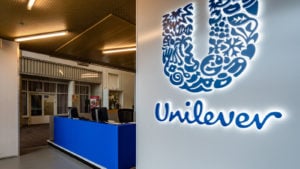Once again, March CPI was hotter than expected, putting to bed the theory that January and February’s strength was due to seasonal factors. Even Federal Reserve Chairman Powell recently stated there was a lack of progress toward the 2% target. As a result, rates have rallied year-to-date. Meanwhile, investors have dialed back rate cut expectations with Fed Fund Futures pricing in fewer rate cuts this year.
Higher rates will pressure growth sectors, especially unprofitable technology and biotech stocks. Instead, assets generating cash flow today, like consumer staples stocks, will do well. And if anything, these stocks didn’t participate in last year’s rally and are cheaper than the S&P 500.
Constellation Brands (STZ)

This alcoholic beverage company is the perfect way to play offense and defense. Its main product, beer, which accounts for over 80% of sales, is recession-resistant, meaning sales will do well in all economic conditions. Plus, the stock is showing earnings growth and has a reasonable valuation.
Constellation Brands (NYSE:STZ) benefited tremendously from the Bud Light scandal last year. As Bud Light sales tanked, its brand Modelo saw significant sales increases in the U.S. Modelo Especial leapfrogged Bud Light to become the top-selling beer in the U.S. in May 2023.
Due to the strong momentum, fiscal year 2024 net sales grew 5% to $9.96 billion. The beverage company also demonstrated operating leverage, delivering operating margins of about 33%. As a result, operating income was $3.17 billion, growing 11%.
According to Circana, Constellation Brands was the 2023 growth leader among $8 billion-plus consumer packaged goods companies. Moreover, management expects the growth momentum to continue in FY2025, projecting net sales growth of 6% to 7%. The beer business will grow even faster, at 7% to 9%.
Putting it all together, the impressive growth and reasonable valuation make Constellation Brands one of the top consumer staples stocks to buy. Management expects EPS of $13.40 – $13.70 in FY2025. Thus, you can buy the stock at 19 times forward earnings.
Sysco (SYY)

Although it’s an obscure company, Sysco (NYSE:SYY) is integral to daily life. It’s the largest food distributor in the U.S., delivering food and related supplies to hotels, schools, restaurants and hospitals. This boring business generates steady profits, making it one of the best consumer staples stocks.
Despite being a boring business, it has grown revenues at a steady rate. Although there was a slight slowdown during the pandemic, sales grew from $58.7 billion in FY2018 to $76.3 billion in FY2023. Post-pandemic revenue growth has reaccelerated, delivering a 19% compounded annual growth rate over the past 3 years.
As mentioned above, Sysco is an extremely profitable business. The revenue growth has translated into even faster profit growth. Over the past three years, earnings before interest and taxes grew at a 41% CAGR.
Looking ahead, management expects modest growth, projecting mid-single-digit revenue growth for the fiscal year ending July 2024. Moreover, from Sysco’s robust free cash flow generation, they have committed to maintaining its Dividend Aristocrat status and buying back stock.
During Q2 FY2024, it paid $252.7 million in dividends. Additionally, it expects to return $2.25 billion to shareholders in FY2024 via buybacks. In terms of growth, Sysco is a leader in the highly fragmented food service distribution industry and will continue to grow.
Unilever (UL)

Unilever (NYSE:UL) is one of the largest fast-moving consumer goods companies by sales. As of this writing, it has 14 brands with sales exceeding $1 billion, highlighting its brands strength. With power brands such as Dove, Rexona, Lux and Omo, this is one of the best consumer staples stocks.
Unilever sells necessities in personal care, beauty and wellbeing, home care and nutrition, which are part of everyday life. Therefore, it offers steady earnings growth and great returns to shareholders.
Even better, if you buy UL stock today, you could benefit from the ongoing restructuring. Historically, Unilever has earned lower margins than peer Procter & Gamble (NYSE:PG). To improve the business, activists led by Trian’s Nelson Peltz are working with management to implement strategic changes.
In the planned changes, management has decided to prioritize 30 power brands that account for 75% of turnover, dispose of non-core businesses and cut costs. According to Reuters, it plans to spin off its ice cream unit and slash 7,500 jobs.
As of this writing, Unilever’s EBITDA margins are 18% compared to Proctor & Gamble’s 28%. With the strategic improvements, profitability could improve significantly. Indeed, at 18 times forward earnings, this is one of the cheapest consumer staples stocks due to the potential profitability improvements.
On the date of publication, Charles Munyi did not hold (either directly or indirectly) any positions in the securities mentioned in this article. The opinions expressed in this article are those of the writer, subject to the InvestorPlace.com Publishing Guidelines.
Charles Munyi has extensive writing experience in various industries, including personal finance, insurance, technology, wealth management and stock investing. He has written for a wide variety of financial websites including Benzinga, The Balance and Investopedia.
